International Political Economy (pdf)
24 Pages7853 Words15 Views
Added on 2021-06-17
International Political Economy (pdf)
Added on 2021-06-17
ShareRelated Documents
Running Head: BRICS 1
International Political Economy.
Students Name
Institution
International Political Economy.
Students Name
Institution
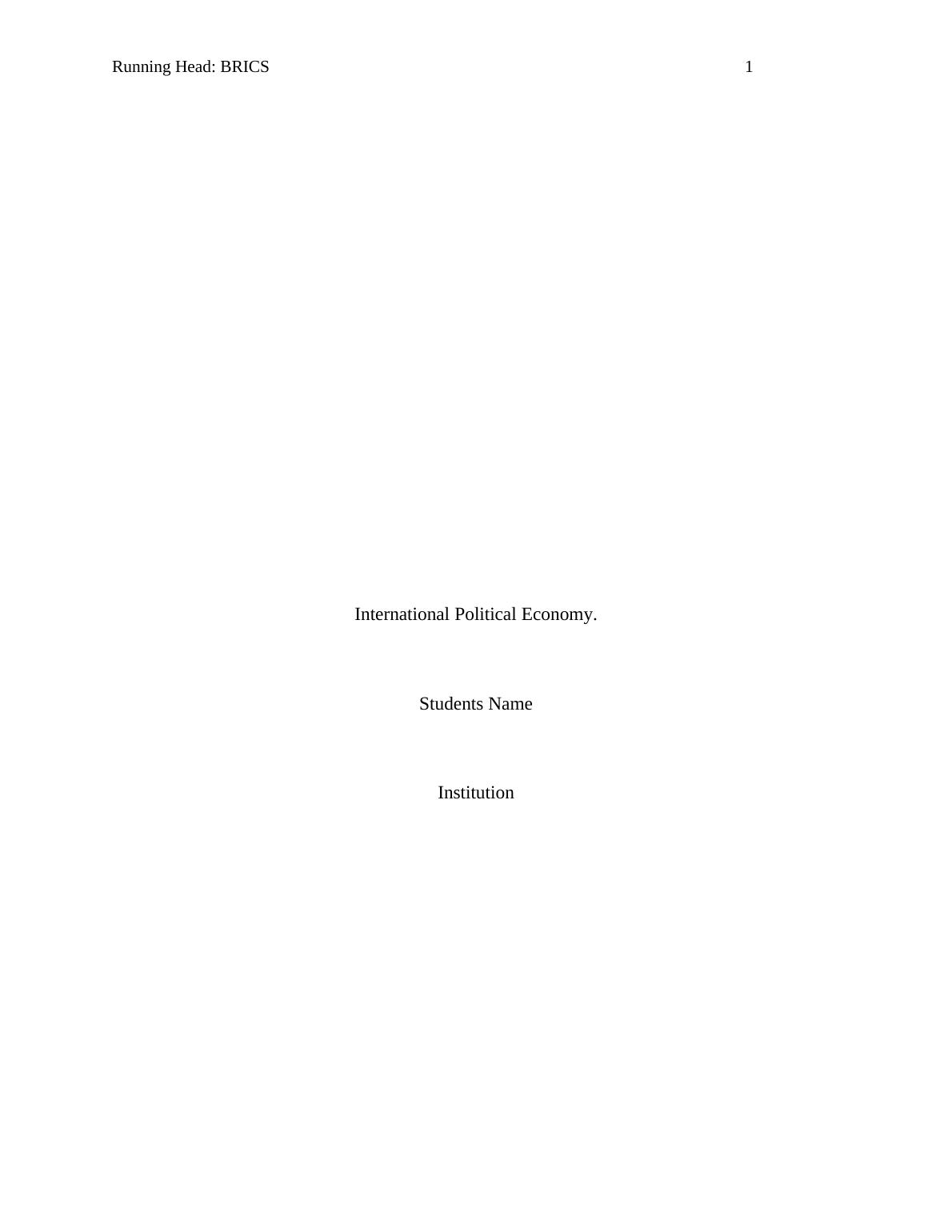
Running Head: BRICS 2
Abstract
Primarily, this essay focusses on the four emerging economies: Brazil, Russia, India,
China and South Africa (Brics).The Brics is considered a formidable group of economically fast
developing countries in the world. There are various notable achievements of the economic
partnership. However, there are various challenges or setbacks which have curtailed the success
and relevance of Brics. There are various individual country economic and political challenges
which have negatively painted the Brics. However, all in all, the relevance, changes and role
played by the Brics cannot be ignored in the event that the challenges mentioned are overcome.
Abstract
Primarily, this essay focusses on the four emerging economies: Brazil, Russia, India,
China and South Africa (Brics).The Brics is considered a formidable group of economically fast
developing countries in the world. There are various notable achievements of the economic
partnership. However, there are various challenges or setbacks which have curtailed the success
and relevance of Brics. There are various individual country economic and political challenges
which have negatively painted the Brics. However, all in all, the relevance, changes and role
played by the Brics cannot be ignored in the event that the challenges mentioned are overcome.
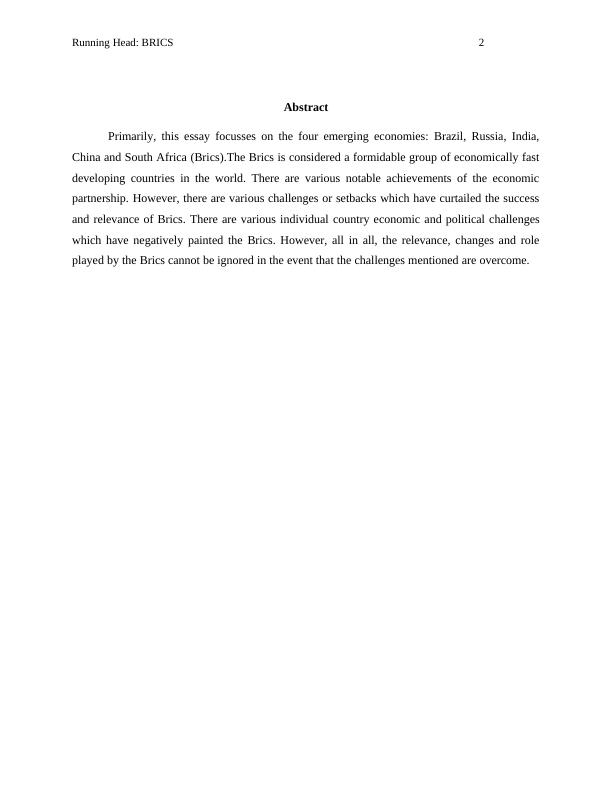
Running Head: BRICS 3
INTRODUCTION
Notably, BRICS is an economic bloc made up of five countries. Specifically, the countries,
Brazil, Russia, India, China, and South Africa are behind its formation .However, prior to 2011,
South Africa wasn’t part of Brics. According to Goldman Sachs, who formulated the term,
BRICS, these five economies are forecasted to be the dominating economies by the year
2050(Investopedia, 2018).BRICS is a combination of a possible powerful economies than a
political affiliation. According to O’Neill, these five countries are a formidable economic
powerhouse in the twenty first century. The strengths of these countries lies on the population,
abundance in natural resources, bigger supply chains and their ability to integrate their
economies with the globalization to their own advantages. Individually, these five countries form
part of the world’s largest economies and by forming a trading partnership, they are a formidable
force to reckon with. The successes of the countries under BRICS has not gone unnoticed by the
global economy and neither have the challenges. Among the notable successes of the bloc is the
setting up of the new development bank, equal governance (Presidency of the bloc) is rotational
in nature, economic and cultural cooperation among others. On the Challenge front, there is
member states economic growth decline, corruption, delayed decision making due to
disagreements, political instability in Brazil, recessive phases, drop in commodity prices (oil),
sanctions issued on Russia by Western countries, lack of unity in matters of international
importance, competition, corruption among other factors that need to be overcome for the Brics
reputation to keep standing.
Noteworthy, BRICS contribution to the global GDP between the year 1990 to the year
2014 is estimated to have risen from 11 % to 30%(Bremmer,2017).The economic strengths of
these countries stems from the abundance of natural resources for Brazil ,South Africa and
Russia. Primarily, South Africa is blessed with precious metals such as Gold, platinum and
diamond whose exportation has abundantly grown its economy following the Apartheid period in
the 1990’s.The abundance of energy resources such as natural gas, crude oil had propelled the
growth of the Russian economy after the Soviet Union regime. For Russia and South Africa, the
abundance of natural resources has greatly boosted their economic performance in the global
trade arena. These two countries are able to export part of their abundant natural resources into
the global economy leading to substantial revenue percentages .Exportation of their unique
INTRODUCTION
Notably, BRICS is an economic bloc made up of five countries. Specifically, the countries,
Brazil, Russia, India, China, and South Africa are behind its formation .However, prior to 2011,
South Africa wasn’t part of Brics. According to Goldman Sachs, who formulated the term,
BRICS, these five economies are forecasted to be the dominating economies by the year
2050(Investopedia, 2018).BRICS is a combination of a possible powerful economies than a
political affiliation. According to O’Neill, these five countries are a formidable economic
powerhouse in the twenty first century. The strengths of these countries lies on the population,
abundance in natural resources, bigger supply chains and their ability to integrate their
economies with the globalization to their own advantages. Individually, these five countries form
part of the world’s largest economies and by forming a trading partnership, they are a formidable
force to reckon with. The successes of the countries under BRICS has not gone unnoticed by the
global economy and neither have the challenges. Among the notable successes of the bloc is the
setting up of the new development bank, equal governance (Presidency of the bloc) is rotational
in nature, economic and cultural cooperation among others. On the Challenge front, there is
member states economic growth decline, corruption, delayed decision making due to
disagreements, political instability in Brazil, recessive phases, drop in commodity prices (oil),
sanctions issued on Russia by Western countries, lack of unity in matters of international
importance, competition, corruption among other factors that need to be overcome for the Brics
reputation to keep standing.
Noteworthy, BRICS contribution to the global GDP between the year 1990 to the year
2014 is estimated to have risen from 11 % to 30%(Bremmer,2017).The economic strengths of
these countries stems from the abundance of natural resources for Brazil ,South Africa and
Russia. Primarily, South Africa is blessed with precious metals such as Gold, platinum and
diamond whose exportation has abundantly grown its economy following the Apartheid period in
the 1990’s.The abundance of energy resources such as natural gas, crude oil had propelled the
growth of the Russian economy after the Soviet Union regime. For Russia and South Africa, the
abundance of natural resources has greatly boosted their economic performance in the global
trade arena. These two countries are able to export part of their abundant natural resources into
the global economy leading to substantial revenue percentages .Exportation of their unique
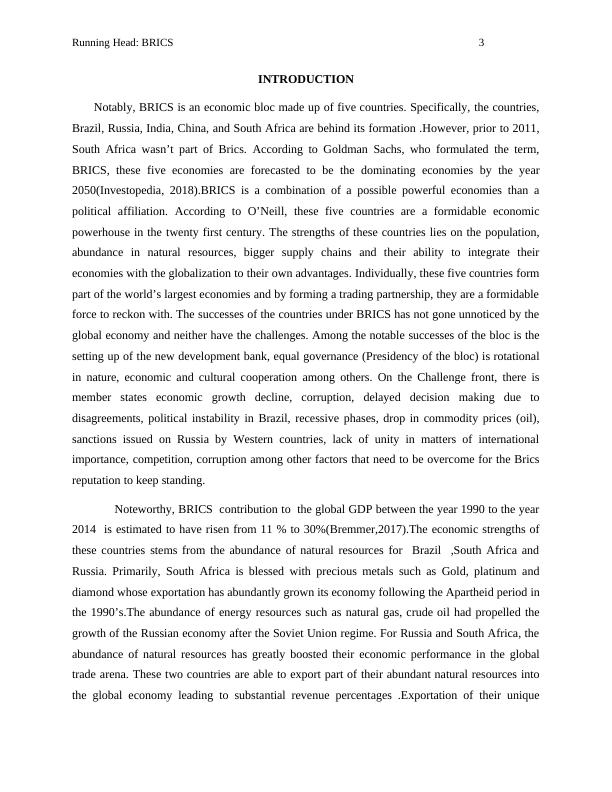
Running Head: BRICS 4
resources into the global economy has made them enjoy comparative advantages in the global
economy. For the countries, China, India, globalization has played a critical role in integrating
their supply chains. These two countries are taking advantage of the globalized economy to
expand their supply chains. Particularly, China is considered the 2nd largest economy based on its
GDP after the United States of America. India is considered a leading exporter of Information
Technology services in the world hence a huge revenue contributor to its country. India enjoy
comparative advantages in IT.
ECONOMIC PERFORMANCE AND CHALLENGES OF INDIVIDUAL COUNTRIES
Undoubtedly, individual member states of Brics have been facing unique internal and
external economic challenges and China is no exception. These challenges have slowed down the
economic growth rate of the individual countries and the economic partnership bloc as a whole.
The devaluation of the Chinese currency in the year 2015 slowed down its economic growth rate.
Usually, currency devaluation implies the depreciation in value of the currency of a given
country. Also, the Indian currency “denotisation “in the year 2016 adversely impacted its
economic performance (Kong, 2017). India sought to remove large currency notes from
circulation as a measure of dealing with corruption. During this period, the Indian currency
circulation stability was impossible to achieve thus the reduced economic activity in the country.
In addition, Russia experienced an extensive recessive face towards the end of the year 2015
which reduced the economic activity in the country. The recent recession period seems to be
longest since the 1990’s.The recessive phase is based on the seasonally adjusted estimates of the
year 2015. However, due to the rising oil prices, the Russian economy is back on a steady
recovery face which will in turn affect the trading volume of the Brics. Prior to the recent
Russian recessive phase, Russia had always recorded surplus trade and foreign exchange reserve.
These economic changes taking place in these countries are exposing Brics to dominance doubts
to the rest of the world.
In addition, the Russian economy has been battling its own challenges. The consecutive
contraction rate of the Brazilian economy for eight quarters hasn’t been good for the Brazilian
economy. There has been reduced economic activity in Russia due to the fall in commodity
prices. The fall of commodity prices has made it expensive for the Russian economy to maintain
a competitive edge over its competitors. Also, the recent political instabilities following the
resources into the global economy has made them enjoy comparative advantages in the global
economy. For the countries, China, India, globalization has played a critical role in integrating
their supply chains. These two countries are taking advantage of the globalized economy to
expand their supply chains. Particularly, China is considered the 2nd largest economy based on its
GDP after the United States of America. India is considered a leading exporter of Information
Technology services in the world hence a huge revenue contributor to its country. India enjoy
comparative advantages in IT.
ECONOMIC PERFORMANCE AND CHALLENGES OF INDIVIDUAL COUNTRIES
Undoubtedly, individual member states of Brics have been facing unique internal and
external economic challenges and China is no exception. These challenges have slowed down the
economic growth rate of the individual countries and the economic partnership bloc as a whole.
The devaluation of the Chinese currency in the year 2015 slowed down its economic growth rate.
Usually, currency devaluation implies the depreciation in value of the currency of a given
country. Also, the Indian currency “denotisation “in the year 2016 adversely impacted its
economic performance (Kong, 2017). India sought to remove large currency notes from
circulation as a measure of dealing with corruption. During this period, the Indian currency
circulation stability was impossible to achieve thus the reduced economic activity in the country.
In addition, Russia experienced an extensive recessive face towards the end of the year 2015
which reduced the economic activity in the country. The recent recession period seems to be
longest since the 1990’s.The recessive phase is based on the seasonally adjusted estimates of the
year 2015. However, due to the rising oil prices, the Russian economy is back on a steady
recovery face which will in turn affect the trading volume of the Brics. Prior to the recent
Russian recessive phase, Russia had always recorded surplus trade and foreign exchange reserve.
These economic changes taking place in these countries are exposing Brics to dominance doubts
to the rest of the world.
In addition, the Russian economy has been battling its own challenges. The consecutive
contraction rate of the Brazilian economy for eight quarters hasn’t been good for the Brazilian
economy. There has been reduced economic activity in Russia due to the fall in commodity
prices. The fall of commodity prices has made it expensive for the Russian economy to maintain
a competitive edge over its competitors. Also, the recent political instabilities following the
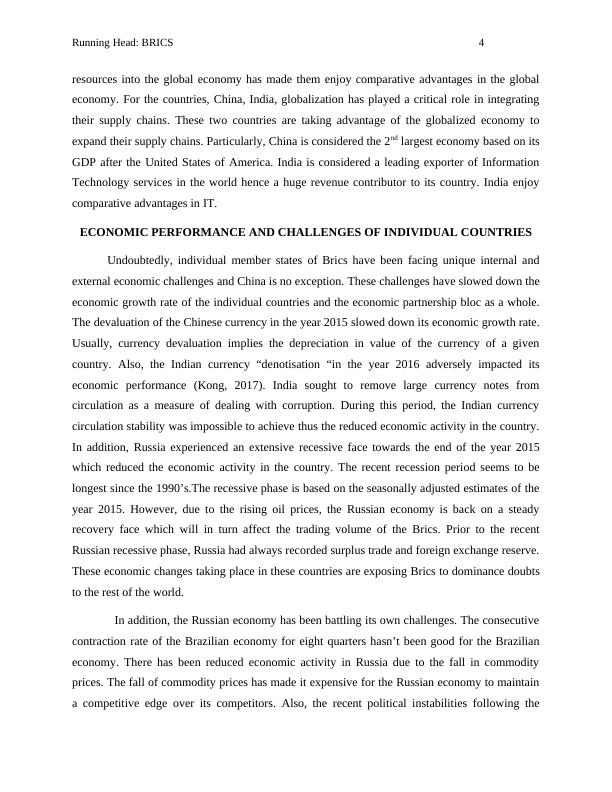
Running Head: BRICS 5
impeachment of its president has negatively affected the economic output of the country. This is
because in the case of political instability, investor confidence is adversely affected, the flow of
capital is affected by the change in government and without peace which is achieved through
political stability, and it is difficult to conduct any fruitful economic activity. This temporary
political crisis is curtailing the Russian economic growth rate and affecting the Russian duties to
the economic partnership of Brics hence a challenge for the Brics as an economic partner. (Kong,
2017).In addition, high inflationary pressure in Brazil is also responsible for the slow economic
activity in the country hence it is not contributing much to the global economy. For economic
growth to prevail, there is need for political stability and will otherwise the economic potential of
the affected country cannot be attained. Peace is very vital to the conduct of global and national
economic development. Without a stable political environment, economic activity does not
flourish.
Primarily, Brazil gross domestic product growth rate has gone down .Specifically, between
the months of January and March 2017, the Brazilian gross domestic growth rate was estimated
to have grown by 1% from the previous year. Also, prior to the year 2017, the Brazilian economy
growth rate had negative growth levels which is putting into doubt the relevance of Brazil (FP
Staff, 2017).In addition, the Russian recessive phases hasn’t made the relevance of the economic
partnership any memorable. Mainly, the Russian economic contraction phase is due to the fall in
global oil pricing. With the low prices in oil, the Russian revenue is reducing substantially due to
its huge dependence on its energy sector. Alongside the dwindling oil prices, Russian economy is
facing sanctions from western countries thereby limiting its economic activity and revenue from
partaking in global trade. The various individual challenges wrecking the Brics member states is
making the world challenge their emerging economy growth and relevance to the international
global economy. The South African economy faced dismal economic growth levels in the year
2017 which fact hasn’t done much to uphold the economic dominance concept of the
Brics.These challenge are casting a cloud on the economic supremacy of Brics according to an
article by the Business day. These macroeconomic and micro-economic changes in the Brics
nations is making the world doubt as to the whether these countries will be able to live up to the
hype that has been created among them .It is imperative that the five emerging countries address
their internal problems quickly and effectively to keep growing and developing in order to
maintain relevance.
impeachment of its president has negatively affected the economic output of the country. This is
because in the case of political instability, investor confidence is adversely affected, the flow of
capital is affected by the change in government and without peace which is achieved through
political stability, and it is difficult to conduct any fruitful economic activity. This temporary
political crisis is curtailing the Russian economic growth rate and affecting the Russian duties to
the economic partnership of Brics hence a challenge for the Brics as an economic partner. (Kong,
2017).In addition, high inflationary pressure in Brazil is also responsible for the slow economic
activity in the country hence it is not contributing much to the global economy. For economic
growth to prevail, there is need for political stability and will otherwise the economic potential of
the affected country cannot be attained. Peace is very vital to the conduct of global and national
economic development. Without a stable political environment, economic activity does not
flourish.
Primarily, Brazil gross domestic product growth rate has gone down .Specifically, between
the months of January and March 2017, the Brazilian gross domestic growth rate was estimated
to have grown by 1% from the previous year. Also, prior to the year 2017, the Brazilian economy
growth rate had negative growth levels which is putting into doubt the relevance of Brazil (FP
Staff, 2017).In addition, the Russian recessive phases hasn’t made the relevance of the economic
partnership any memorable. Mainly, the Russian economic contraction phase is due to the fall in
global oil pricing. With the low prices in oil, the Russian revenue is reducing substantially due to
its huge dependence on its energy sector. Alongside the dwindling oil prices, Russian economy is
facing sanctions from western countries thereby limiting its economic activity and revenue from
partaking in global trade. The various individual challenges wrecking the Brics member states is
making the world challenge their emerging economy growth and relevance to the international
global economy. The South African economy faced dismal economic growth levels in the year
2017 which fact hasn’t done much to uphold the economic dominance concept of the
Brics.These challenge are casting a cloud on the economic supremacy of Brics according to an
article by the Business day. These macroeconomic and micro-economic changes in the Brics
nations is making the world doubt as to the whether these countries will be able to live up to the
hype that has been created among them .It is imperative that the five emerging countries address
their internal problems quickly and effectively to keep growing and developing in order to
maintain relevance.
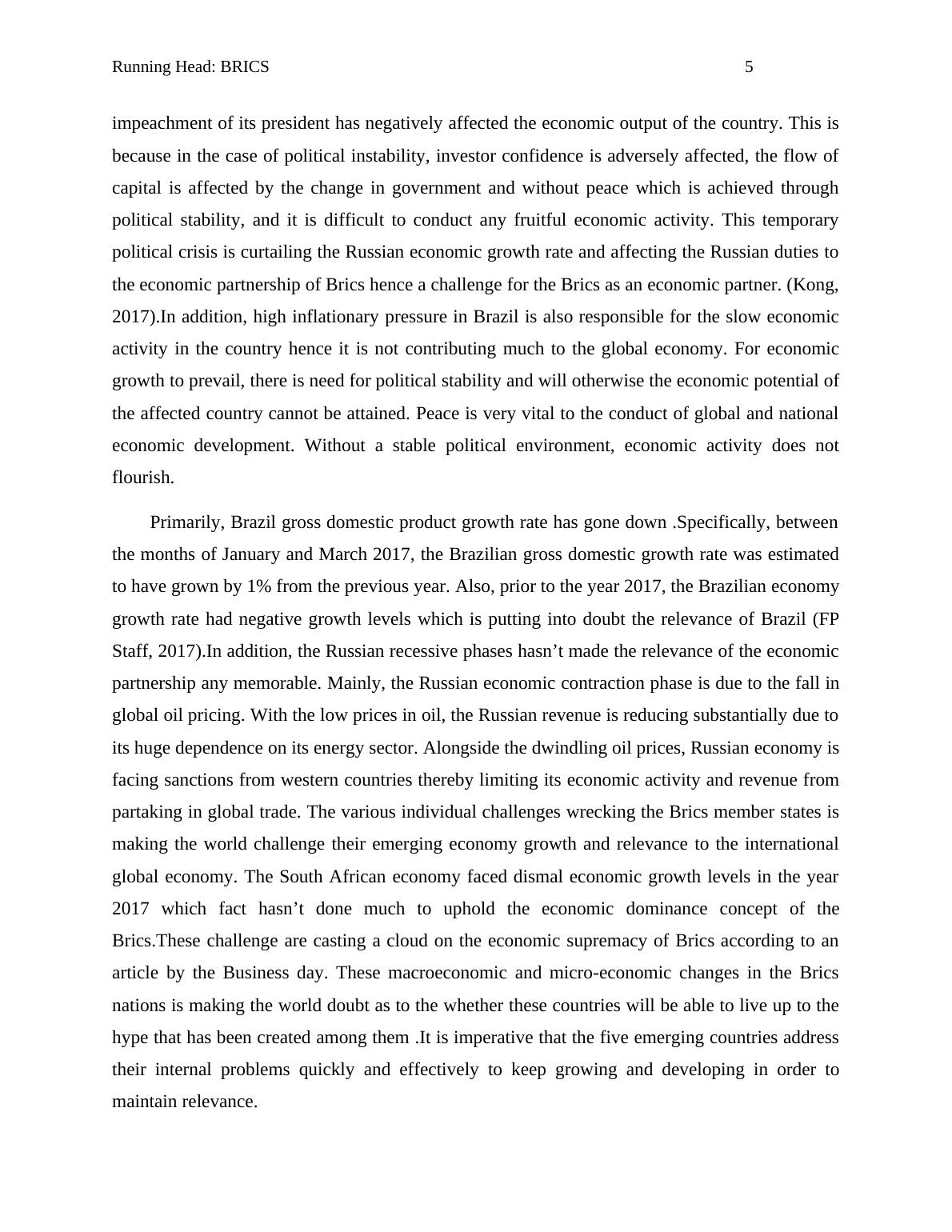
Running Head: BRICS 6
ACHIEVEMENT OF BRICS AS A BLOC
Undeniably ,Brics role in addressing global economy challenges cannot be sidelined
thus the assertion that the emerging economies are important to
globalization(O’Neill,2016).Noteworthy, Brics representatives are defending the economic
interest of growing market economies at the global level. Through the formation of the
development bank, the trading bloc is expanding its influence of global financial matters which
is an encouraging move for other emerging global economies. Brics has played a vital role in
boosting governance, cooperation at the global economic level (Lei, 2017).Collective voicing of
international and regional challenges to the economic and political challenges facing the world
goes to show how important the bloc is to the global governance and tacking global challenges.
Through Brics, the voice of emerging economies is heard at the global level owing to the fact
that some of Brics members have an important vote in the global financial framework. Following
the economic partnering of the five countries, the economic output has increased from 12% to
23% of the global GDP (Lei, 2017).Particularly, Brics export trade volume has risen from 11%
to 16 % of the global output by the year 2017.Additionally, the five countries enjoy a 13.24%
voting stake in the World Bank operations which goes to show the emerging economies
participation in global financial matters. Through the formation of Brics, cultural and educational
cooperation has improved through the implementation of collective athletic, film and cultural
events for its member states thus enhancing the relationship between the five countries. Cultural
events grow unity.
Notably, Brics is reputable for introducing a new international economic order (Ingram &
Poon, 2013). With the establishing of the development bank with the same status and features of
international financial institutions, the five countries have made its mark into the way
international finance institutions at the international framework work. Owing to this
development, the decisions of the Brics on the global economy carry as much weight as other
reputable international economic institutions and order .The Brics has made substantial changes
to the Bretton Woods systems which for a long time has been responsible for a given way of
economic international order.Brics economical decisions on global issues receives global
recognition due to their rising economic supremacy. Prior to the Brics, Western countries have
dominated the international economic order.However,the Brics is now a major player in the
ACHIEVEMENT OF BRICS AS A BLOC
Undeniably ,Brics role in addressing global economy challenges cannot be sidelined
thus the assertion that the emerging economies are important to
globalization(O’Neill,2016).Noteworthy, Brics representatives are defending the economic
interest of growing market economies at the global level. Through the formation of the
development bank, the trading bloc is expanding its influence of global financial matters which
is an encouraging move for other emerging global economies. Brics has played a vital role in
boosting governance, cooperation at the global economic level (Lei, 2017).Collective voicing of
international and regional challenges to the economic and political challenges facing the world
goes to show how important the bloc is to the global governance and tacking global challenges.
Through Brics, the voice of emerging economies is heard at the global level owing to the fact
that some of Brics members have an important vote in the global financial framework. Following
the economic partnering of the five countries, the economic output has increased from 12% to
23% of the global GDP (Lei, 2017).Particularly, Brics export trade volume has risen from 11%
to 16 % of the global output by the year 2017.Additionally, the five countries enjoy a 13.24%
voting stake in the World Bank operations which goes to show the emerging economies
participation in global financial matters. Through the formation of Brics, cultural and educational
cooperation has improved through the implementation of collective athletic, film and cultural
events for its member states thus enhancing the relationship between the five countries. Cultural
events grow unity.
Notably, Brics is reputable for introducing a new international economic order (Ingram &
Poon, 2013). With the establishing of the development bank with the same status and features of
international financial institutions, the five countries have made its mark into the way
international finance institutions at the international framework work. Owing to this
development, the decisions of the Brics on the global economy carry as much weight as other
reputable international economic institutions and order .The Brics has made substantial changes
to the Bretton Woods systems which for a long time has been responsible for a given way of
economic international order.Brics economical decisions on global issues receives global
recognition due to their rising economic supremacy. Prior to the Brics, Western countries have
dominated the international economic order.However,the Brics is now a major player in the
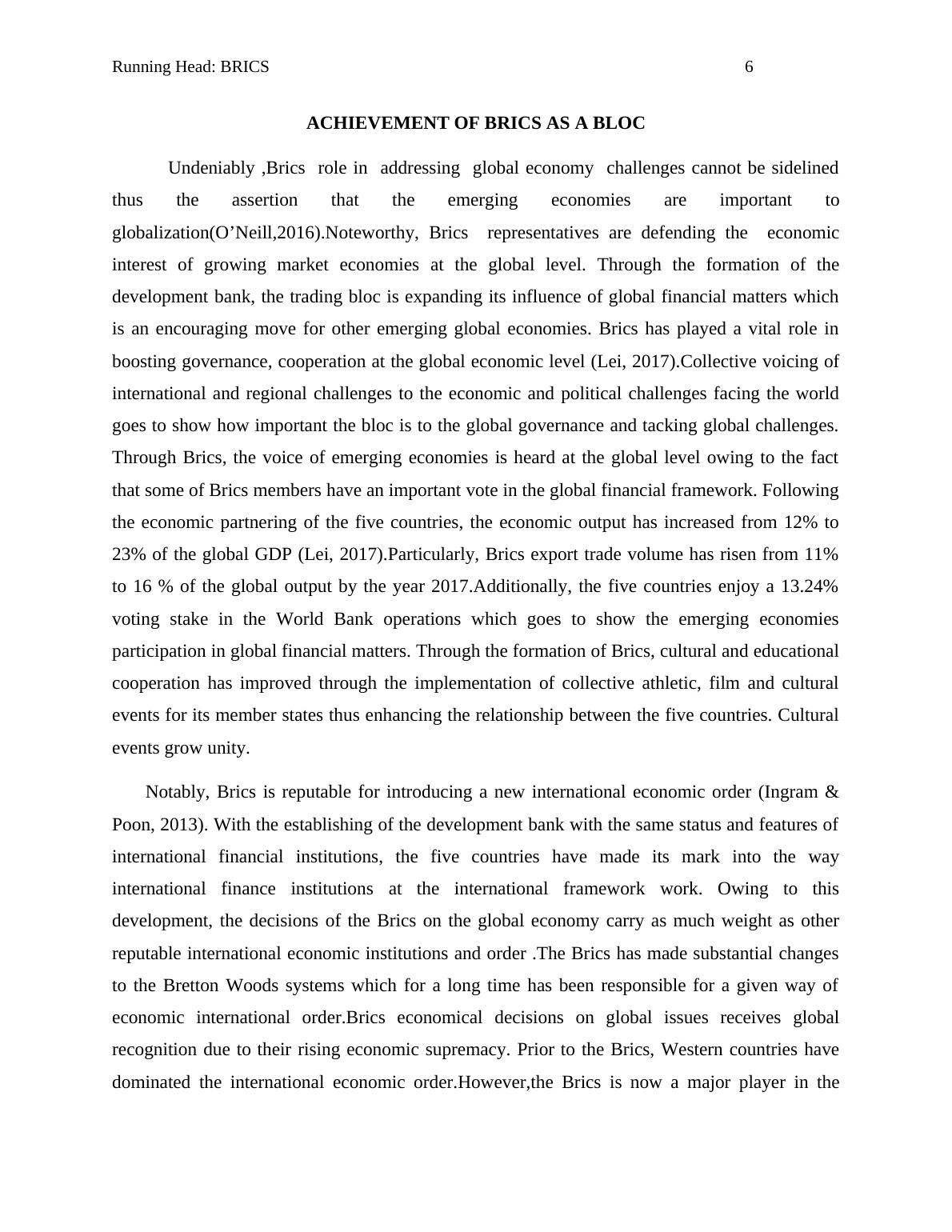
End of preview
Want to access all the pages? Upload your documents or become a member.
Related Documents
BRICS: Achievements and Failureslg...
|6
|1538
|365
Political Economy of development PDFlg...
|17
|3859
|21
MGMT8110 - Global Perspectiveslg...
|13
|565
|81
The Rise of BRICS from Developing Countries to Emerging Economieslg...
|29
|7490
|27
Analyze Global Trade Environment (pdf)lg...
|12
|2830
|186
International Political Economy | BRICSlg...
|19
|6027
|22
